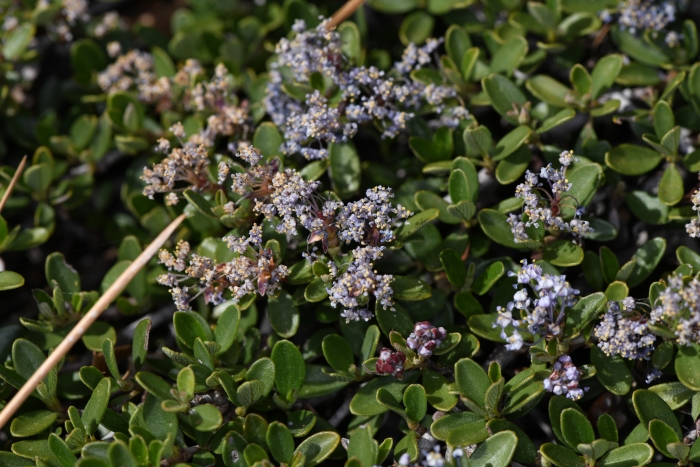Fresno Mat
(Ceanothus fresnensis)
Fresno Mat (Ceanothus fresnensis)
/
/

Chloe and Trevor Van Loon
CC BY 4.0
Image By:
Chloe and Trevor Van Loon
Recorded By:
Copyright:
CC BY 4.0
Copyright Notice:
Photo by: Chloe and Trevor Van Loon | License Type: CC BY 4.0 | License URL: http://creativecommons.org/licenses/by/4.0/ | Rights Holder: Chloe and Trevor Van Loon | Publisher: iNaturalist | Date Created: 2022-05-14T16:39:52-07:00 |

























Estimated Native Range
Summary
Ceanothus fresnensis, commonly known as Fresno Mat, is an evergreen shrub endemic to California, specifically native to chaparral, dry woodland, and coniferous forest habitats in the central Sierra Nevada and its foothills. This low-growing plant forms flat, spreading mats that can reach up to 20 feet in width, with reddish-brown stems that root at the nodes to help stabilize soil on slopes. The small, oval leaves are typically 1-2 cm long, with some varieties featuring toothed margins. From late winter to early spring, Fresno Mat produces showy clusters of pale to bright blue flowers, which are highly attractive to pollinators such as bees and butterflies. The fruit is a small, horned capsule that may persist on the plant after the flowering season.
Fresno Mat is valued for its drought tolerance and ability to provide dense ground cover, making it an excellent choice for erosion control and xeriscaping in dry regions. It is also used in native plant gardens and restoration projects. In cultivation, it requires minimal water once established, well-drained soils, and thrives in full sun to partial shade. While generally low-maintenance, it can be susceptible to root rot if overwatered or planted in poorly drained soils. There are no popular garden cultivars listed for this species, but its natural form is well-suited to the purposes it serves. Gardeners should be aware that Ceanothus species can be short-lived and may need replacement after several years.CC BY-SA 4.0
Fresno Mat is valued for its drought tolerance and ability to provide dense ground cover, making it an excellent choice for erosion control and xeriscaping in dry regions. It is also used in native plant gardens and restoration projects. In cultivation, it requires minimal water once established, well-drained soils, and thrives in full sun to partial shade. While generally low-maintenance, it can be susceptible to root rot if overwatered or planted in poorly drained soils. There are no popular garden cultivars listed for this species, but its natural form is well-suited to the purposes it serves. Gardeners should be aware that Ceanothus species can be short-lived and may need replacement after several years.CC BY-SA 4.0
Plant Description
- Plant Type: Shrub
- Height: 1-3 feet
- Width: 4-6 feet
- Growth Rate: Slow
- Flower Color: Blue, Purple
- Flowering Season: Spring, Summer
- Leaf Retention: Evergreen
Growth Requirements
- Sun: Part Shade, Full Shade
- Water: Low
- Drainage: Fast, Medium
Common Uses
Bee Garden, Butterfly Garden, Drought Tolerant, Low Maintenance, Showy Flowers
Natural Habitat
Native to chaparral, dry woodland, and coniferous forest habitats in the central Sierra Nevada and its foothills
Other Names
Common Names: Fresno Ceanothus
Scientific Names: , Ceanothus fresnensis, Ceanothus fresnensis, Ceanothus rigidus var. fresnensis,
GBIF Accepted Name: